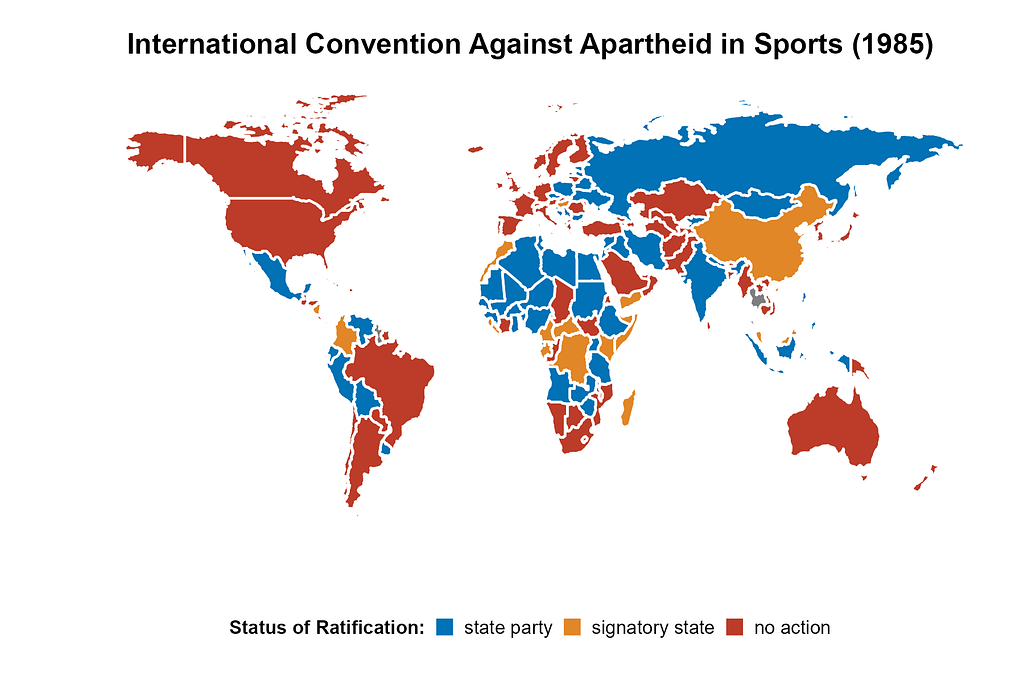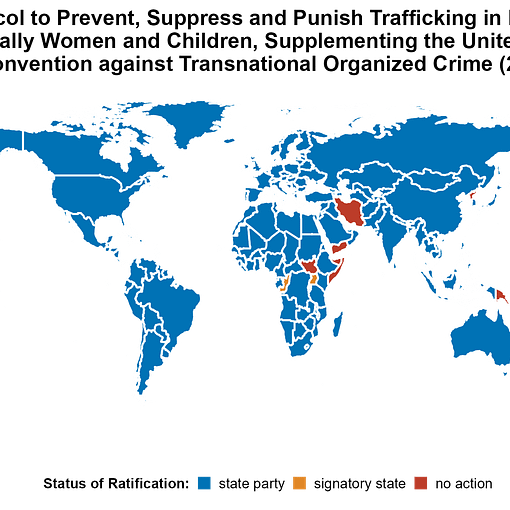It is challenging to envision a world without sports—an arena where everyone is welcomed, regardless of race, sex, ethnicity, or religion. However, this inclusive sports community wasn’t always the reality, particularly in apartheid-ridden South Africa. Since 1948, South Africa’s apartheid policies systematically segregated society, extending even to sports. Those who deemed this division immoral and inhumane initiated a boycott, leading to South Africa’s exclusion from international competitions like the Commonwealth and Olympic Games in the early 1960s. While this was a step forward, it wasn’t sufficient to completely abolish apartheid, prompting the need for multilateral action. The world’s growing anti-apartheid sentiment culminated in the 1985 International Convention against Apartheid in Sports, which played a pivotal role in condemning apartheid in sports, particularly in South Africa.
This treaty, housed under Chapter IV of the United Nations Treaty Collection, aims to address apartheid in athletic participation, with a particular focus on South Africa. Article 1 of the present Convention defines “apartheid” as institutionalized racial segregation by one racial group over another, intended to establish and maintain domination. Articles 3-8 of the treaty specifically outline the obligations of state parties in condemning South African apartheid within athletic competition, covering areas such as mixed teams, interracial competitions, participation of non-white players in ‘white only’ locations, the racial composition of foreign teams visiting South Africa, and mixed audiences. This treaty operates in conjunction with other significant human rights treaties, including the International Convention on the Elimination of All Forms of Racial Discrimination and the International Convention on the Suppression and Punishment of the Crime of Apartheid. Its adoption aims to establish effective measures at both international and national levels to end apartheid in sports.
The cultural significance of this treaty garnered recognition from states worldwide, evidenced by the number that have either signed or ratified it since its inception in 1985. The map below delineates the treaty’s ratification status, categorizing states into three distinct groups: signatory states, state parties, and those that have yet to take any action.

The mélange of colors depicted on the map reflects the treaty’s extensive reach, with 56 state parties and 26 signatory states represented, alongside 106 states yet to take action regarding its ratification. Among those yet to ratify or sign the treaty are prominent nations such as Canada, Brazil, Argentina, and the three democratic members of the Security Council’s Permanent Five: France, the United Kingdom, and the United States. In contrast, China and Russia, the other two Permanent Five members with less democratic leanings, have either signed or ratified the treaty. Despite widespread support for the treaty and its objectives, a majority of the United Nations’ recognized states have not participated in its ratification.
The impact of South Africa’s ousting would likely have been amplified if a majority of states had participated in the ratification of this treaty, especially nations like France, the United Kingdom, and the United States. This is intriguing considering that the principles of equality and respect are fundamental tenets of both modern-day sports and democracies. Particularly noteworthy is the United States’ lack of support for the apartheid boycott, despite the significant cultural importance of sports in the country, both historically and presently. The written and signed support from these three nations, along with other prominent democracies like Canada and Australia, could have potentially hastened the process of South Africa’s abolition of apartheid, particularly within the realm of sports.
Despite the limited participation in the treaty’s ratification process, the International Convention against Apartheid in Sports proved effective in ousting South Africa and ultimately convincing the state to denounce its practice of apartheid. Subsequent to the treaty’s implementation, South Africa launched various community initiatives, such as Kicking for Peace and FIFA-sponsored Play Soccer, aimed at mitigating the effects of apartheid at the local level. This progress enabled South Africa to participate in international sporting events, including the 1992 Olympics in Barcelona, and subsequently hosting prestigious tournaments like the Rugby World Cup in 1995, the African Nations Cup of Soccer in 1996, and the FIFA World Cup in 2010. The international effort to oust South Africa and its racist policies, epitomized by the creation of the International Convention against Apartheid in Sports, played a pivotal role in facilitating South Africa’s integration into the global sports community.
Apartheid had entrenched itself in the daily lives of South African citizens since 1948, fostering deliberate exclusivity among the population and resulting in the denial of the state’s participation in international sports. The implementation of the International Convention against Apartheid in Sports aimed to condemn apartheid in South Africa, and despite limited written support worldwide, the treaty effectively eradicated this policy from a culturally significant aspect of South African life. Today, it holds South Africa and other states accountable for their actions in the realm of sports and serves as a poignant reminder of the power of collective action.
About the authors:
Arielle DeTorres is a junior studying Psychology with a double minor in Political Science and Philosophy.
Lauren Geiger is a senior graduating in May, with a double major in Political Science and French.
Editor's note: This entry was written for Drew University's PSCI 329 Principles in International Law course.



